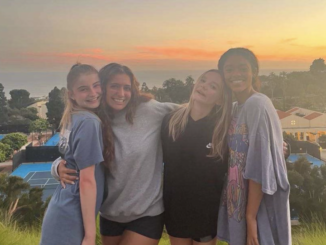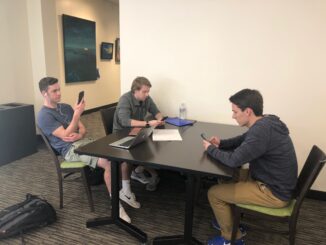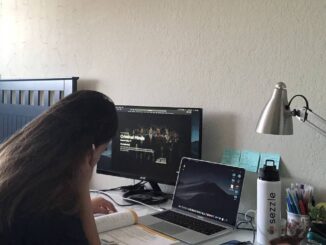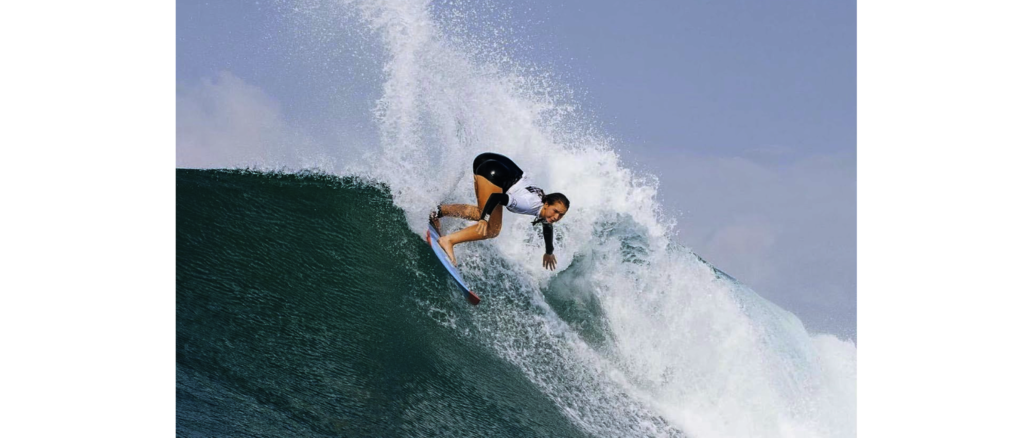
More than 300 student-athletes compete for Pepperdine University’s 17 Division I sports teams, according to a 2023 Media Factual study.
But there’s also a handful of professional athletes pursuing a degree on the Malibu campus. These professional athletes face a unique set of circumstances as they attempt to balance college academics, practice hours and competitions the university does not recognize.
“It’s hard in my sport to balance school and really wanting to be a pro athlete,” said Kiera Hennigan, an equestrian and a senior public relations major. “I’m not training quite as much because I don’t have the opportunity or the time.”
Despite these challenges, Hennigan, surfer Pua DeSoto and ice skater Josephine Billings stand by the importance of earning a bachelor’s degree.
The Athletes’ Past Success
Hennigan has had a very successful career as she was the Pacific Coast Horse Shows Association (CPHA) Grand Champion for the 18-35 age category Equitation in 2020, the Junior Women’s Medal Finals Champion in 2021 and the CPHA 21 and under Foundation High Point Rider in 2023.
First-year business major Pua DeSoto has won 12 state titles, nine national titles and has earned Waterwoman of the Year twice. Throughout her surfing career, she said she has valued success and representing her culture within surfing.
First-year psychology major Josephine Billings competes for team USA and has won many skating championships in her career, according to Skating Scores, Billings and her coach. In November, she competed at the United States sectional competition after placing top four in the regional competition.
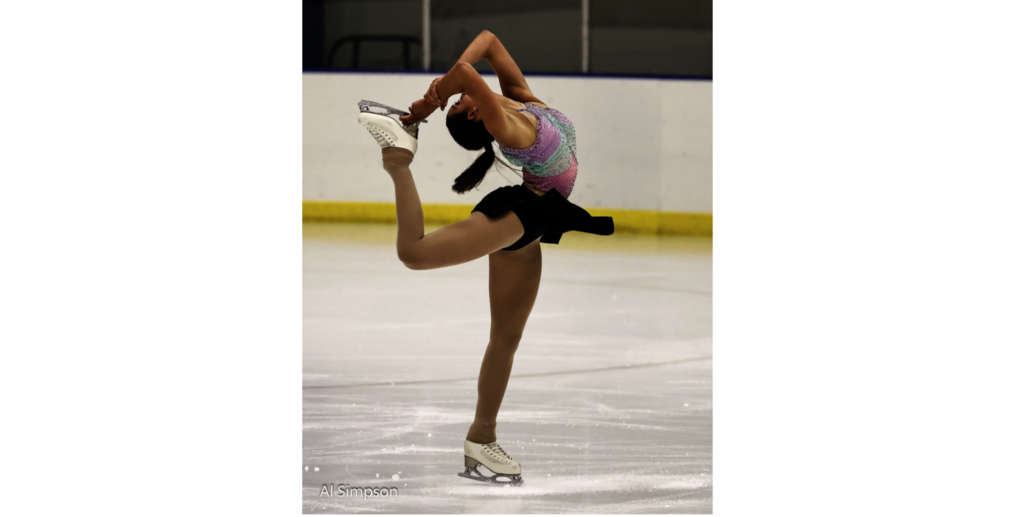
These athletes’ success derives from their love for their sport.
“I fell in love with it the moment I got on a horse,” Hennigan said.
DeSoto and Billings had similar experiences with their immediate passion for surfing and skating.
DeSoto has had a built-in coach her whole life because her father is the 2010 world champion longboard surfer. Pua said her dad had her on a surfboard before she could walk.
“My love for surfing came from constantly being around it,” DeSoto said.
Billings remembers where her love for her sport began at 4 years old.
“It was the Olympics on TV,” Billings said. “I stood up from the bed and said, ‘I want to do that.'”
Billings went to an open skate the next day, where her journey began. By 9, she knew that skating was something she wanted to take seriously and be a tough competitor.
To be as good as DeSoto, Billings or Hennigan at their respective sports, it takes an immense amount of time.
“It takes 10,000 hours to become really good at something,” Sport Administration Professor Jessica Stallworth said.
Challenges mount adjusting to college
Billings had the same schedule in high school every day, but her new schedule at Pepperdine has been an adjustment. In high school, Billings would train on and off ice six days a week for about seven hours daily. She combined online and in-person school to adapt to her busy schedule.
This time and energy paid off.
“The level that she’s achieved is achieved by less than 100 people in the country every year,” Billings’ Coach Sarah Capizzo said.
However, maintaining the same training in college is more challenging. Billings must drive 45 minutes to the nearest rink, Icoplex in Simi Valley, every time she trains. She also has a much higher workload in college, so she doesn’t have the same amount of time to train as she did in high school.
Hennigan took a gap year before attending Pepperdine to compete nationally but has faced obstacles with her training during her time at Pepperdine.
Hennigan used to train 12 hours daily, but since attending college, she has had to reduce her hours to fit her class schedule. With limited days she can miss class, Hennigan has had to miss competitions. With less chances to test herself against the best, she said not competing has hindered her development as an athlete.
DeSoto has faced similar time management issues as a student and a professional shortboard surfer.
“To be honest, it’s been really hard to find that management of time,” DeSoto said. “Getting used to being a college student and the workload has been very different.”
Time management is extra challenging for athletes who aren’t a part of a Pepperdine team.
“I don’t play a sport that is a part of the school, so I don’t get any benefits,” Hennigan said.
Athletes who are not affiliated with a Pepperdine team don’t get the same assistance as official student-athletes. Those benefits include preferential scheduling around practice times, access to academic tutors and approved time away from class for competitions and games.
“You can’t build schedules ahead of time or miss school,” Hennigan said.
Mental stamina helps students succeed in the classroom and competition
Collegiate academics add a lot to an athlete’s plate. School is mentally challenging, but competing at the highest level in a sport also takes its toll on an athlete’s mental fitness.
Duane DeSoto, Pua DeSoto’s father and coach, understands this struggle from his experience as a professional surfer. He helps Pua DeSoto navigate this unforgiving aspect of their sport.
“You have to be pushed to the edge of your mental capacities,” Duane DeSoto said. “Sometimes past it to understand being the best in the world.”
Capizzo also attested to the persistence it takes to be competitive in the skating world.
“We joke about how crazy it is that skaters go out and chuck their bodies against concrete covered in a layer of ice every day,” Capizzo said.
Billings has nine coaches because skating requires multiple types of training. There is on-ice training when she runs her short and long programs numerous times and works on the skills needed within those programs.
There is also off-ice training, which consists of weight and strength training, stretching and mental coaching. Billings spends a lot of time with her sports psychologist to strengthen the mental aspect of her competition. This has been successful, as she just placed fifth at Regionals for Team USA.
“Every day from 6 to 7 p.m., I would have mental practice and psychology,” Billings said.
Earning a degree is paramount to achieving long-term goals
A bachelor’s degree is the most common degree for professional athletes, with 80% of professional athletes earning one, according to a July 2023 Zippia study.
With all the time and energy put into their sport, many wonder why professional athletes bother with a degree or an education. Duane DeSoto said a degree is important because it is challenging to make a living out of surfing.
“It’s not the ideal job or way to make money,” Duane DeSoto said. “You really do lose more than you win sometimes in surfing.”
Pua DeSoto, Billings and Hennigan don’t compete in mainstream sports, which make the most profit.
Athletes who aren’t in a mainstream sport have trouble profiting from their athletics, no matter how good they are, Stallworth said. Their niche sports can also cost a lot to pursue.
“It can cost even more out of pocket because it isn’t a readily available sport in all areas,” Stallworth said.
For instance, it costs between $35,000 and $50,000 a year to be an Olympic-level figure skater,
Lia Ryerson wrote in a 2018 Business Insider article.
This money commitment is something that many athletes have to consider when deciding whether to take their competition to the next level, from amateur to professional.
“If you really want to be professional, you have to think,‘Do I really want to spend all this money on something?’” Billings said.
For these three professional athletes, the intricate balance between the rigor of college academics and demanding training and competition schedules is not enough to deter them from pursuing a sport they have been passionate about for as long as they can remember.
In the future, Billings said she aspires to be a sports psychologist to work with and help athletes like herself because she understands the pressure of a competitive atmosphere during youth. Hennigan is earning her public relations degree. Pua DeSoto wants to start multiple businesses and use her minor to encourage sustainability and bring awareness to the importance of sustainable businesses.
While their ultimate athletic endgame may differ, their academic goal is shared — earning a college degree to support themselves long after their professional sports careers have ended.
Katherine Lytle reported this enterprise story in Jour 241 during the Fall 2023 semester under the supervision of Dr. Christina Littlefield and Dr. Theresa de los Santos. Dr. Littlefield supervised the web article.


